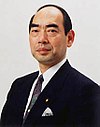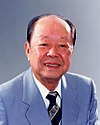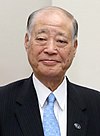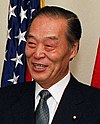Obuchi Cabinet (2nd reshuffle)
| Obuchi Cabinet (2nd reshuffle) | |
|---|---|
| 84th Japanese Cabinet (2nd transformation) dai-84-dai naikaku (dai-2-ji-kaizō) |
|

|
|
|
Prime Minister Naikaku Sōri-Daijin |
Keizo Obuchi |
| Legislative period | 146-147 Kokkai (41st Shūgiin , 18th Sangiin ) |
| Appointed by | Emperor Akihito |
| education | October 5, 1999 |
| The End | April 5, 2000 |
| Duration | 0 years and 183 days |
| predecessor | Obuchi Cabinet (1st transformation) |
| successor | Cabinet Mori I |
| composition | |
| Party (s) | LDP , Kōmeitō , LP → KP , ( KC ) |
| minister | 19 (1 resignation) |
| State Secretaries | 1 Special Advisor to the Prime Minister 3 Parliamentary Vice-Heads of the Cabinet Secretariat 32 "Parliamentary Vice-Ministers" |
| representation | |
| Shūgiin | 356/500 (29.10.1999) |
| Sangiin | 143/252 (14.1.2000) |
| Opposition leader | Yukio Hatoyama (Shūgiin, DPJ ) |
The cabinet, which was reorganized for the second time, Obuchi ( Japanese 小 渕 第 2 次 改造 内閣 Obuchi dainiji kaizō naikaku ) ruled Japan under the leadership of Prime Minister Keizō Obuchi from October 5, 1999 to April 5, 2000. On September 21, 1999, Obuchi was the party chairman LDP was confirmed and then filled the leadership positions of the LDP and the cabinet. In addition, he had agreed with the Kōmeitō on their entry into the governing coalition of the LDP and Liberal Party . The Kaikaku Club (“Reform Club”) now also worked with the government, but did not provide a minister of state, but only a parliamentary state secretary (seimujikan) .
In March 2000 Ichirō Ozawa wanted to leave the coalition with his Liberal Party. However, some members, including Transport Minister Nikai, opposed him and wanted to continue cooperation. On April 1, 2000 you founded the Conservative Party . On the same day, Obuchi suffered a stroke and was replaced two days later by Chief Cabinet Secretary Aoki. The cabinet remained in office until Yoshirō Moris was elected LDP chairman and prime minister on April 5, 2000.
Minister of State
Note: The prime minister and party leader does not officially belong to any political group during his term of office.
resignation
- The chairman of the Commission for the Reform of the Financial System, Michio Ochi, resigned on February 25, 2000 after controversial statements made to representatives of credit institutions .
Web links
Individual evidence
- ↑ Activities of the Shūgiin 2000 No. 8, 146. Kokkai (extraordinary). shugiin.go.jp; accessed on June 23, 2018
- ↑ Membership figures of the political groups ( Memento of March 3, 2000 in the Internet Archive ) sangiin.go.jp
- ↑ 辞 任 、 更迭… 志 半 ば で 大臣 の 座 を 去 っ た 政治家 た ち ( Memento from August 21, 2013 in the Internet Archive )


















